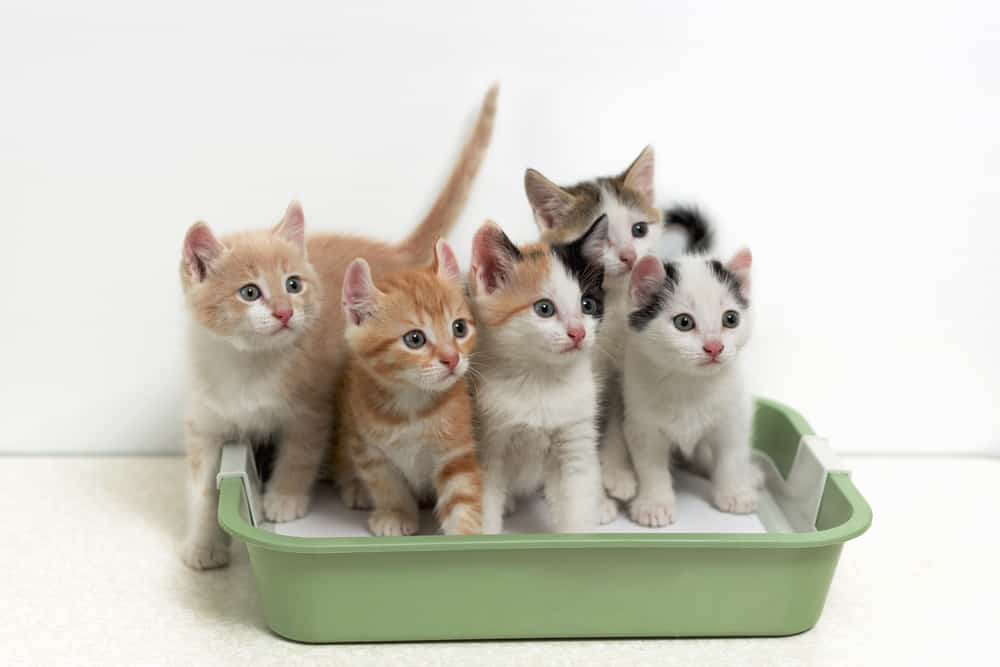
Two or more cats might lounge on the same cat tree and play with the same toys, but when it comes to sharing their bathroom situation, your furry friends will be less than excited. While some multi-cat households may be able to get away with it, it's usually a recipe for disaster.
So can two cats share the same litter box? And, more importantly, should they?
Although some households might prefer to maintain only one litter box, it’s never recommended to force two cats to share the same litter box as it can cause stress, increase aggression, and result in out-of-box urination.
We’ll cover the main problems that pop up when multiple cats use the same litter box, why they need more than one litter box, and how to make adjustments if something prevents you from keeping multiple litter boxes in your home.
Let's get started!
Why You Might Want Your Cats To Share A Litter Box
One of the more challenging tasks as a cat owner is maintaining a litter box.
While you'll learn some tricks along the way (like switching to wood or pellet litter) to make the task easier it doesn't change the fact that each cat will use the litter box several times a day, so cleaning the box daily and deep cleaning on a regular basis can take up a lot of time.
You might find cleaning a single litter box easier than cleaning two. You might also have very little free space to keep litter boxes, and having only one fits better in your home or apartment.
While a lack of space is a difficult hurdle to overcome when providing your cats with enough litter boxes, using a single litter box when you have two cats isn’t ideal and can cause more harm than good.
Heck, it's better to just put two different litter boxes next to each other instead of only having one.
Why Shouldn’t Cats Share The Same Litter Box?
Okay, so we know that we cats shouldn't share but let's dive deep into the specific reasons why.
Reason 1: Cats Are Territorial Animals
Cats are naturally territorial creatures, which can sometimes be surprising for cat owners. But the fact is, all that cheek marking, headbutting, and even scratching are all manifestations of a cat's natural urge to claim their turf.
In the wild, cats would control large areas of land and sharing would be out of the question in most cases.
Your cat's wild instincts tell them to see new cats as potential intruders in their own space, and they can even be aggressive toward familiar cats if they’re particularly choosy about who hangs out in the territory they see as their own.
Although general aggression is common between male cats, territorial aggression is just as common in female cats. Chasing and ambushing are regular occurrences when one or more cats see a shared space as their own territory and want to keep other cats out. Of course, spaying and neuter can make a big difference here too.
But when a litter box is placed in that same space, cats may feel unsafe using the toilet because they know another cat visits the area and could consider it a breach of territory.
At the risk of anthropomorphizing too much, consider three options for your own bathroom breaks: your own home, a friend's home, and a gas station bathroom.
You're of course going to be most comfortable in your own bathroom. That's your territory and it's where you feel more comfortable.
Using your friend's bathroom is okay, and that's probably the closest comparison to two cats in the same home having to share a litter box. It's not great but they can usually handle it.
The worst, of course, would be the gas station bathroom. That's not what we're talking about here but that would be the equivalent of several cats having to use the same litter box and something that should absolutely be avoided!
Reason 2: Cats Like A Clean Toilet
It’s usually recommended that you scoop the litter box daily, but if you have multiple cats using a single litter box, you may need to scoop more frequently. Most cats will dislike a litter box that smells, but really finicky cats can become stressed out if they can’t find a clean place to use the toilet.
A cat's reaction could range from staring at the box to let you know there's a problem to simply finding a new place to use the bathroom.
If you have two cats using a single litter box, you’ll need to clean it more often to keep it up to your cats’ standards. That’s not always possible, especially if you’re out of the house for long periods of time. Two cats who use multiple litter boxes are less likely to be upset by cleanliness issues since there are more bathroom options available and less mess in any one spot.
You might dislike having several litter boxes to clean, but you also might find the consequences of using a single litter box for two cats much more frustrating.
Not only is it more likely that one or both cats will urinate in inappropriate places to avoid messy litter boxes, they both might experience additional anxiety and unhappiness.
Reason 3: Cats Don’t Love To Share
Just like cat trees, which we previously wrote about here, cats aren’t that fond of sharing a litter box with another cat. Being forced to share can increase kitty conflicts and cause unneeded stress if one cat has to wait for the other to use the toilet.
Even if your cats get along well and aren’t usually aggressive, anxiety can occur if one or both feel like there’s competition for the only bathroom they have.
Even our feline friends need to use the bathroom in peace. If you’ve ever shared a bathroom with a sibling or other family member and found yourself fighting for your “turn”, you know a little bit about how your cats feel when they’re forced to share a single litter box.
Reason 4: Sharing a Single Litter Box Can Lead To Health Problems
Stress by itself isn’t the only reason two cats shouldn’t share a single litter box. While stress may be the first reaction, many cats who are anxious about their litter box situation may avoid going until they can’t wait any longer. This might come from the fear of an ambush, but it might also happen if you’re not able to clean the litter box as often as you should with two felines.
Cats who wait to pee because they don’t want to use the litter box you’ve set out for them may be more susceptible to bladder problems. Feline Lower Urinary Tract Disease (known as FLUTD) is a large term for many bladder disorders that can occur in cats. Several of these conditions are thought to be caused by stress and any kind of bladder inflammation in cats can make peeing uncomfortable and difficult, which will continue a cycle of stress and urination problems.
Providing two cats with more than a single litter box should reduce the chance that your cat will “hold it” for too long and cause a bladder condition. While treatable, preventing health problems related to poor litter box conditions is really the best move in the long run.
What Is an Ideal Litter Box Situation for Two Cats?
Now, you might be thinking that giving each cat their own litter box is the best option. While this is better, it’s still not the perfect situation.
A good rule of thumb is the One Plus One rule, which we’ve written about before. The rule states that you should have one litter box per cat, plus one more. For a household with two cats, this means that you should have a total of three litter boxes to satisfy their needs.
However, you shouldn’t just group multiple litter boxes in one location and call it a day.
While putting litter boxes beside each other may seem like an easy way to follow the One Plus One rule and save a bit of space, most cats will consider the grouped boxes part of the same territory.
Even though you see two or three, your cat will recognize them as one big litter box. Placing each litter box in its own location allows for both cats to use the toilet in an area of their choice. This should prevent your cats from “holding it”, eliminating in the wrong places, or ambushing each other.
You may find that your cats will each choose a preferred litter box when they have several options, but in some households, cats will use whichever is close, available, and safe. Even if another cat has used the box, a cat will be less likely to experience toilet anxiety if it doesn’t have to compete for bathroom time.
What if I Don’t Have Room For More Than One Litter Box?
While it’s important to make sure you can provide a healthy environment for your cats, some situations make having multiple litter boxes difficult or impossible.
Ideally, you should only limit two cats to a single litter box in emergency or temporary situations, but if you do find that a single litter box is your only option for a longer period of time, there are some things you can do to make the litter box cleaner and more appealing.
Use Litter Made for Multiple Cats
Many brands offer multi-cat litter, which is recommended for households with multiple cats. Multi-cat litters are usually clumping litters with odor eliminators, which make cleaning easier and prevent undesirable smells from chasing off you, your cats, and any unsuspecting house guests. Clumping litters are usually best for preventing litter from sticking to the side and other mess-making problems.
Using a multi-cat litter should reduce some of the issues that cause cats to avoid the litter box, and hopefully make the experience much more pleasant. Even if you are able to set up multiple litter boxes, you should still consider multi-cat litter in a household with two or more cats.
Clean Often
It’s worth repeating that cleaning the litter box daily is an essential task for cat owners, but you will likely need to scoop more often if two of your cats share a single litter box. This might seem inconvenient, but even increasing your cleaning schedule to twice a day can make a huge difference in how your cats feel about their only toilet.
Consider making cleaning a part of your morning and bedtime routines. Or, if you are home enough to notice when your cats use the litter box, try to clean it after you see them go or whenever you pass through the room where the litter box lives.
The whole process can be made easier if you keep your scoop, waste bags, and other litter cleaning supplies on a shelf or in an organizer right near the box. Quick cleans will become second-nature, and you won’t have to linger over an extra-full litter box if you never let it get bad in the first place.
Consider a Robotic Litter Box
Another option is to purchase a self-cleaning, or robotic litter box. A robotic litter box takes away a lot of the extra steps involved in cleaning your cats’ litter. While it won’t prevent territorial aggression, a robotic litter box will ensure that your cats have a clean place to do their business and that might be enough to keep them happy and content.
Robotic, automatic, or self-cleaning litter boxes work by sensing when your cat is in the litter box and removing waste after they’ve left.
The waste is usually raked or dropped into a closed waste bin that also reduces the usual odor people (and pets!) dislike about litter boxes. You’ll still need to regularly deep clean your litter box and follow additional guidelines for maintenance, but the daily cleaning will be taken care of.
Final Thoughts
At the end of the day, even a frequently cleaned litter box can cause added stress, and you can’t be sure that two cats who get along will always be happy to share. Whenever possible, provide enough litter boxes according to the One Plus One rule or take extra care to make a single litter box as suitable as you can.
How many litter boxes do you have in your home? If you have a single litter box for two cats, how do you make it work? We’d love to hear from you!
Read Next: 5 Signs That Cats Don’t Like Each Other





